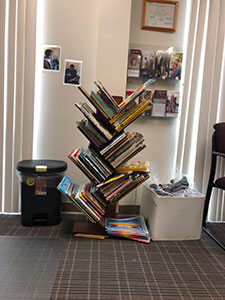Children who visit the Burbank Audiology Center office will find a “book tree” full of engaging, exciting and educational reading opportunities. Dr. Frintner and her staff encourage young patients to choose a book from the shelves that sparks their interest and curiosity and take it home, free of charge. Not only does this give children something to look forward to during their visits to the office, but it also aids in relaxing the patients while an earmold impression is taken. We believe that through our book donation program, we are discouraging screen time at a young age, promoting literacy and increasing the positive effects of the literate thinking process.
 According to the recent study, today’s clinicians and researchers are faced with a new generation of children with mild to severe hearing impairment. The study found these children typically have access to early identification, enhanced hearing technologies and early intervention. Researchers concluded that focus should broaden, to include multidimensional definitions of language and literacy. In addition, consideration should to be given to the ways in which language foundations are established to support children’s literacy and literate thinking processes. (Moeller 2007)
According to the recent study, today’s clinicians and researchers are faced with a new generation of children with mild to severe hearing impairment. The study found these children typically have access to early identification, enhanced hearing technologies and early intervention. Researchers concluded that focus should broaden, to include multidimensional definitions of language and literacy. In addition, consideration should to be given to the ways in which language foundations are established to support children’s literacy and literate thinking processes. (Moeller 2007)
Hearing loss impacts language development, which impacts the development of reading skills. Research has found that competency in reading is based on competency in language and that children who have language delays as a result of hearing loss are at risk for serious reading deficiencies. (Carney and Moeller 1998)
With this in mind, Dr. Mary L. Frintner and the team at Burbank Audiology Center have been supporting the San Fernando Valley, San Gabriel Valley and Greater Los Angeles communities by partnering with teachers and professionals through a book donation program. Dr. Frintner works with teachers who are retiring and would like to donate books to support hearing impaired children’s literacy and literate thinking processes. Additionally, Burbank Audiology Center partners with a local realtor that receives books from homes that have sold.
10 Ways Families can Improve Their Child’s Reading Skills
Set aside a regular time to read to your children every day.
Studies show that regularly reading out loud to children will produce significant gains in reading comprehension, vocabulary and the decoding of words. Whether your children are preschoolers or preteens, it will increase their desire to read independently.
Surround your children with reading material.
Children with a large array of reading materials in their homes score higher on standardized tests. Tempt your kids to read by having a large supply of appealing books and magazines at their reading level. Put the reading materials in cars, bathrooms, bedrooms, family rooms and even by the TV.
Have a family reading time.
Establish a daily 15- to 30-minute time when everyone in the family reads together silently. Seeing you read will inspire your children to read. Just 15 minutes of daily practice is sufficient to increase their reading fluency.
Encourage a wide variety of reading activities.
Make reading an integral part of your children’s lives. Have them read menus, roadside signs, game directions, weather reports, movie time listings, and other practical everyday information. Also, make sure they always have something to read in their spare time when they could be waiting for appointments or riding in a car.
Develop the library habit.
Entice your children to read more by taking them to the library every few weeks to get new reading materials. The library also offers reading programs for children of all ages that may appeal to your children and further increase their interest in reading.
Be knowledgeable about your children’s progress.
Find out what reading skills they are expected to have at each grade level. The school’s curriculum will give you this information. Track their progress in acquiring basic reading skills on report cards and standardized tests.
Look for reading problems.
Teachers do not always detect children’s reading problems until they’ve become serious. Find out if your children can sound out words, know sight words, use context to identify unknown words and clearly understand what they read.
Get help promptly for reading problems.
Reading problems do not magically disappear with time. The earlier children receive help, the more likely they will become good readers. Make sure your children receive necessary help from teachers, tutors or learning centers as soon as you discover a problem.
Use a variety of aids to help your children.
To help your children improve their reading, use textbooks, computer programs, books-on-tape and other materials available in stores. Games are especially good choices because they let children have fun as they work on their skills.
Show enthusiasm for your children’s reading.
Your reaction has a great influence on how hard they will try to become good readers. Be sure to give them genuine praise for their efforts.
If you have a child who is hearing impaired, we are here to help. In addition to our services, there are many resources for education and support that we can connect you with. Please contact our office at (818) 859-7730 to schedule an appointment.
Sources:
Carney, A. & Moeller, M. (1998). Treatment efficacy, hearing loss in children. Journal of Speech, Language and Hearing Research, 41(1)
Moeller, M. (2007). Current state of knowledge: language and literacy of children with hearing impairment.
